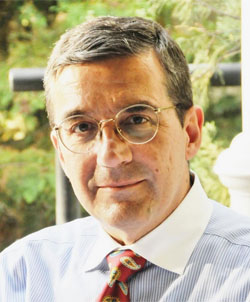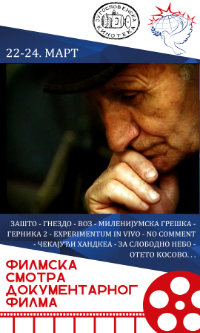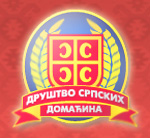More Western Voices of Reason
| Activities - Comments |
By:Srdja Trifkovic | September 12, 2014 My friend (and Tom Fleming’s), former Canadian ambassador in Belgrade James Bissett, published a noteworthy article in last Tuesday’s Ottawa Citizen (“NATO at the Heart of the New Cold War,” September 9). He starts by reminding us that NATO was born at the mid-point of the 20th century, which by that time had already seen two world wars and the dropping of the atom bomb on civilian cities. Its founders were determined that war and violence should not become the norm in resolving disputes, and it was in this spirit that Article I of the treaty was conceived:
My friend (and Tom Fleming’s), former Canadian ambassador in Belgrade James Bissett, published a noteworthy article in last Tuesday’s Ottawa Citizen (“NATO at the Heart of the New Cold War,” September 9). He starts by reminding us that NATO was born at the mid-point of the 20th century, which by that time had already seen two world wars and the dropping of the atom bomb on civilian cities. Its founders were determined that war and violence should not become the norm in resolving disputes, and it was in this spirit that Article I of the treaty was conceived:
The parties undertake, as set out forth in the Charter of the United Nations, to settle any international dispute in which they may be involved, by peaceful means in such a manner that international peace and security and justice are not endangered… and to refrain from the threat or use of force in any manner inconsistent with the purposes of the United Nations.
For fifty years NATO was successful in deterring aggression against the West, Bissett says. It contributed to the creation of a mutual understanding that armed conflict between the two opposing powers was not an option. Critically important, in his view, was Article I itself because it was a guarantee to the Soviet Union that it would never be attacked by NATO forces; this acted as a safety blanket for the Soviets. Ironically, Bissett continues, the fall of the Soviet empire did not foretell the beginning of a new age of peace and security in Europe. On the contrary, its demise caused a crisis in NATO:
After the Warsaw Pact armies had returned home what was the justification of maintaining such an expensive and powerful military force in Europe. NATO’s response was business as usual – a continuation of the Cold war. As the respected former United States Ambassador to Moscow, George F Kennan wrote in 1987, “Were the Soviet Union, to sink tomorrow under the waters of the ocean, the American military industrial complex would have to remain substantially unchanged until some other adversary could be invented. Anything else would be an unacceptable shock to the American economy.”
In Bissett’s view, NATO’s behavior towards Russia is “marked by duplicity, double standards and hypocrisy,” starting with the conversion of the Alliance from a defensive organization to one that could intervene militarily to resolve international disputes by force. The opportunity for this transformation, he says, “occurred with the 78 day bombing of Serbia in March 1999 carried out by NATO without authorization from the UN Security Council. Later, in violation of UN Resolution 1244 reaffirming Serbia’s sovereignty over Kosovo, NATO recognized the unilateral declaration of Kosovo independence – declared without any pretense of a referendum.” During the bombing, on NATO’s 50th birthday, President Bill Clinton announced a new role for the alliance: from that moment on, NATO could intervene wherever and whenever it decided to do so: “Article I of the treaty presumably had been nullified by Presidential decree. The NATO treaty had been turned upside down.” At the same time NATO admitted Poland, Hungary and the Czech Republic, thus breaking the promise made to Mikhail Gorbachev “that if Russia allowed a united Germany into NATO the organization would never expand eastward.”
In Bissett’s opinion the current crisis in Ukraine, which threatens global security, was completely unnecessary – and the responsibility lies entirely in the hands of the United States-led NATO powers; the virulent propaganda onslaught blaming Russia for the instability and violence in Ukraine simply ignores reality and the facts, he says:
NATO, spurred on by the United States, has been determined since the collapse of the Soviet Union to surround Russia with hostile NATO members. The first attempt to win Ukraine over to the West through the Orange Revolution in 2004 failed but NATO kept trying and now has “let slip the dogs of war” on that unfortunate country. It was inevitable that NATO’s expansion eastward would at some point run into hostile Russian reaction. The attack on South Ossetia in 2008 by the US armed and trained Georgian military was the last straw and Russia finally showed its teeth… President Putin had warned that the illegal recognition of Kosovo independence would set a dangerous precedent and endanger the international framework of peace and security. Obviously his warning was unheeded and now the Cold War has started again.
It is time for the citizenry of the NATO countries to demand that the principles contained in the original NATO treaty be honored and that Article I be followed, Bissett concludes: “Bellicose statements, sanctions and other warlike moves (however futile) are not helpful in reaching a peaceful solution.”
| < Prev | Next > |
|---|
| Overstatement from Davos 2017. |
Liberal corporative capitalism, for reasons of lowering traveling costs, proposed not to travel to history alone but packed togather with NATO, EU and unipollar World Order. Workers participation has good chances to step in provisionally, buying time for full scale workers selfmanagment. |









